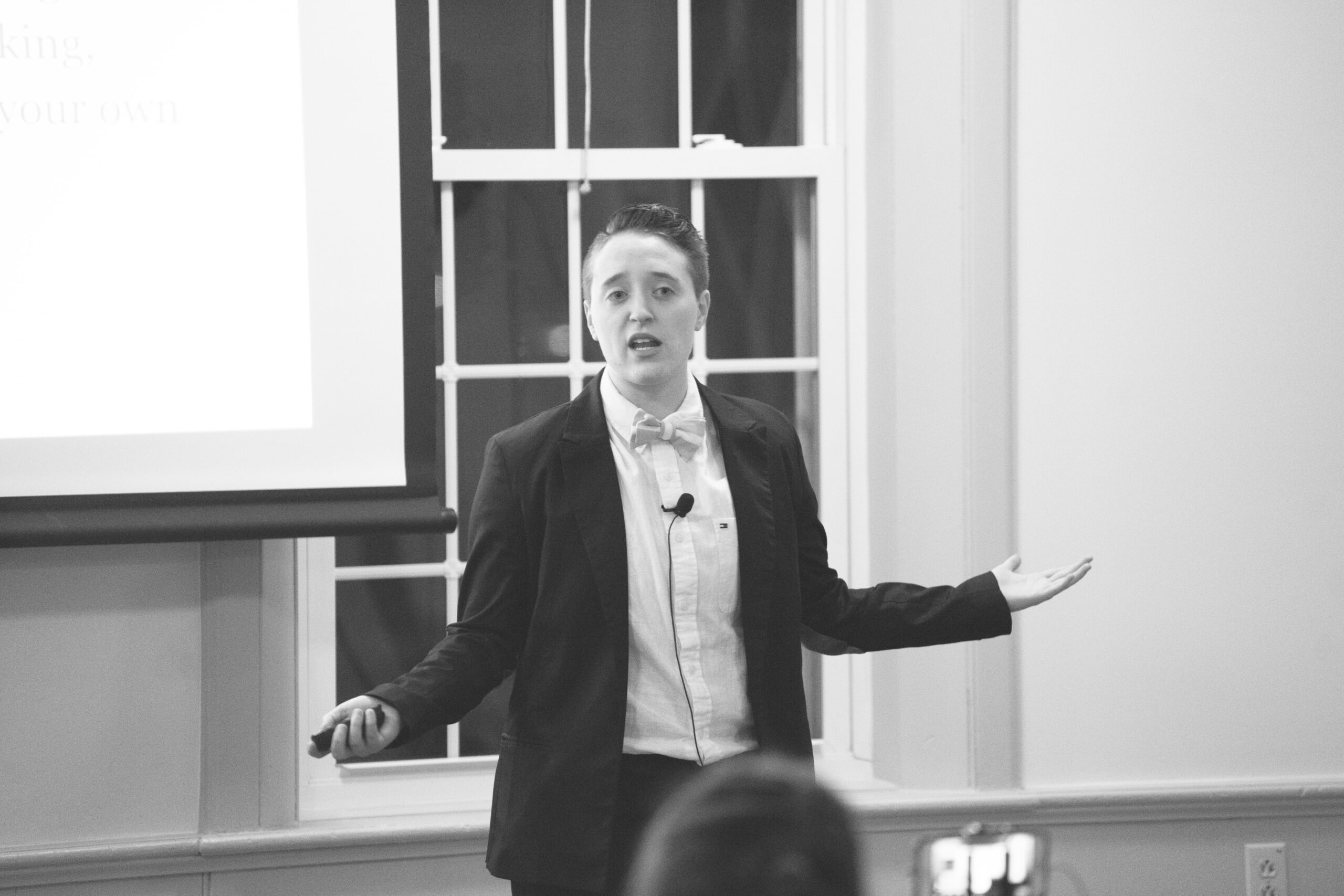Lex Horwitz ’19 stresses importance of education about gender on campus
November 16, 2018
 Jack Burnett
Jack Burnett“I get messages every day from people saying like, ‘You helped me come out to my family’ or ‘You’re the first person I came out to.’ I’m giving people the space to have a queer community,” said Lex Horwitz ’19. “I’m here to say ‘you are valid and really important.’”
On Tuesday, as part of No Hate November programming, Horwitz gave a talk, titled “What’s Gender?”, to a group of students at MacMillan House. Horwitz, a non-binary transmasculine person, is an LGBTQ activist and educator who focuses on gender and sexuality. While Horwitz felt the event was intimate and fun, they hope their presentations can reach broader audiences to promote education and understanding.
“The people that showed up to my event last night were the people that didn’t need to be there,” said Horwitz, “which is why we need to make events that contain important information or conversation required.”
Beyond giving presentations, which focus more on language, vocabulary and explanation, Horwitz uses Instagram and Facebook to advocate for LGBTQ rights through personal experiences. One of their goals is to create a community where people feel supported and seen.
Horwitz is currently working on creating a YouTube channel to make their talks easily accessible.
While their experience on campus has varied, at the end of September this year, Horwitz was excited to begin playing on the varsity men’s squash team.
“I didn’t know that I could feel happy and safe and comfortable on a sports team at Bowdoin,” said Horwitz. “I finally do, and it’s an amazing feeling.”
Throughout their three years playing for the varsity women’s squash team, Horwitz felt increasingly uncomfortable. While they did not feel as though anyone on their team had malicious intentions, they were misgendered by some of their teammates, and at a match a captain once called them by their dead name—the name that they no longer use. They also felt uncomfortable changing in the women’s locker room because of the potential for people to make incorrect assumptions about their gender identity.
“Eventually, I was like, ‘It’s damaging for my mental health to be on this team where I haven’t seen change and I haven’t felt respected,’” said Horwitz. “Not that anyone on the team meant anything out of malice, but it just wasn’t a good environment for me.”
Horwitz met with Ashmead White Director of Athletics Tim Ryan and expressed their desire to be on the men’s team. Ryan worked with them throughout the process of telling the squash teams and creating more private spaces in the locker rooms.
“It’s amazing to see the change happen in the locker rooms,” said Horwitz. “I assumed that I was not going to be allowed on the men’s team and that I would have to fight way harder than I’d potentially have the energy for, but Tim Ryan was ten steps ahead every moment.”
Ryan was extremely supportive of their decision to switch teams. Making the switch required a battery of meetings between Horwitz and both sets of coaches, captains and teams.
“Every single one of these meetings, Tim was there with me, checking in, making sure everything was going well,” Horwitz said. “He’s been an amazing ally.”
Nonetheless, Horwitz still believes the administration has a long way to go in creating an inclusive campus. In order to promote a dialogue around gender and create a space that is more accepting and respectful of all genders and sexualities, Horwitz hopes that a talk about gender and sexuality will become mandatory programming during first-year orientation.
“It’s a great time when you have all these new students that don’t really know what the climate is or what the environment is like on campus who can then receive this information like, ‘Hey, we’ve been told our whole lives that sex equals gender, but that’s not necessarily the case and this is how you respect [trans people],’” said Horwitz.
However, when Horwitz reached out to the Office of Residential Life (ResLife) at the end of last year and asked if they could give a presentation regarding gender and sexuality, ResLife responded by saying that there was not space for such an event.
“Not only was I not allowed to speak at first-year orientation, but I wasn’t even provided with support saying, ‘Hey, we want the first years to do this,’” said Horwitz. “All they did was give my email to [the proctors and RAs], which I could have done myself.”
Horwitz has also been in classes where professors misgendered them. They feel that training around gender should be extended to faculty as well.
“I think that creating this community that has the same commitment and standards of respect about gender also needs to start with the administration doing facilitated training,” Horwitz said.
Through their presentations and activism on social media, Horwitz wants to be a resource for people who are struggling or who want to learn more about gender and sexuality.
“I want to be able to provide a safe, judgement-free zone where individuals can ask whatever questions they have,” said Horwitz. “No question is stupid, no question will offend me, because I’m assuming that all questions come out of a place of ‘Hey, I just don’t understand.’”
Horwitz can be found on Instagram @lex_horwitz and on Facebook @QueerResistLEX.
Editor’s Note, 11/16/2018 at 2:04 p.m.: This article has been updated to clarify the experiences of Lex Horwitz ’19 on the varsity women’s squash team and in communicating with the Office of Residential Life.

Comments
Before submitting a comment, please review our comment policy. Some key points from the policy: